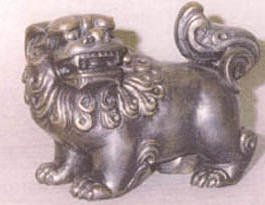|
The History of the Shih Tzu
The Shih-Tzu originated in Tibet where it was kept in temples as a sacred dog. It is known that they were occasionally
given to the Emperors of China during the Manchu dynasty (17th century) as a tribute of great honor and that is how they came
to be established in China.
In that country, the dogs became little temple dogs and were kept in the palace and carefully
guarded and cared for by the court eunuchs. When the Peking Kennel Club was formed in 1934 there was much confusion as to
the difference between certain small breeds. In 1938 an individual standard was set for the Shih-Tzu and it was recognized
as a separate breed from certain other Tibetan breeds.
With the war and the takeover of Peking in 1949 there were
no more exported from China. In 1952 there was a strong fear that the breed was developing poor structure and it was decided
to cross a Pekingese into the line in England. The purpose was to obtain a less leggy dog with a better coat and shorter muzzle.
This was accomplished, however the bowed front legs of the Pekingese are something that still can be seen on some Shih-Tzu
today.
There was also a faction in England called the Manchu Club that believed a smaller dog better represented the
ture heritage of the temple dogs. The Kennel Club recognized this in their 1938 standard by stating the ideal weight was between
9 to 16 pounds which is what the current standard recognizes.
In the United States, fanciers obtained the first Shih-Tzus
in the late 1930s. The breed gained in popularity in 1960, with many imports coming from England and Europe. The breed was
shown in the Miscellaneous class at AKC dog shows. It was not until 1969 that the Shih-Tzu were permitted to be shown as a
separate breed in the Toy Group. In 1969, 2,811 Shih-Tzu were registered which increased to 14,894 in 1978. Within that nine
year period over 85,000 Shih-Tzu were registered with the American Kennel Club, placing the Shih Tzu in the top 25 most popular
breeds according to the AKC. It is no surprise that the temple dog had come into the homes of many owners -- this is due not
only their Imperial background but also to their personality.
|
